Comprehensive CSR Analysis: Principles, Processes, and Outcomes
VerifiedAdded on 2023/06/15
|5
|594
|123
Report
AI Summary
This report provides a comprehensive CSR analysis of a project, addressing the core principles of institutional legitimacy, public responsibility, and managerial discretion. It delves into the CSR processes, including environmental assessment, stakeholder management, and issues management. Furthermore, the analysis examines the outcomes of corporate behavior, focusing on social impacts, social programs, and social policies. The report highlights the importance of ethical conduct and responsible management in achieving favorable social outcomes, improving customer satisfaction, and enhancing the company's competitiveness and profitability. It also emphasizes the significance of stakeholder engagement and proactive issue management in ensuring the successful delivery of socially responsible projects.
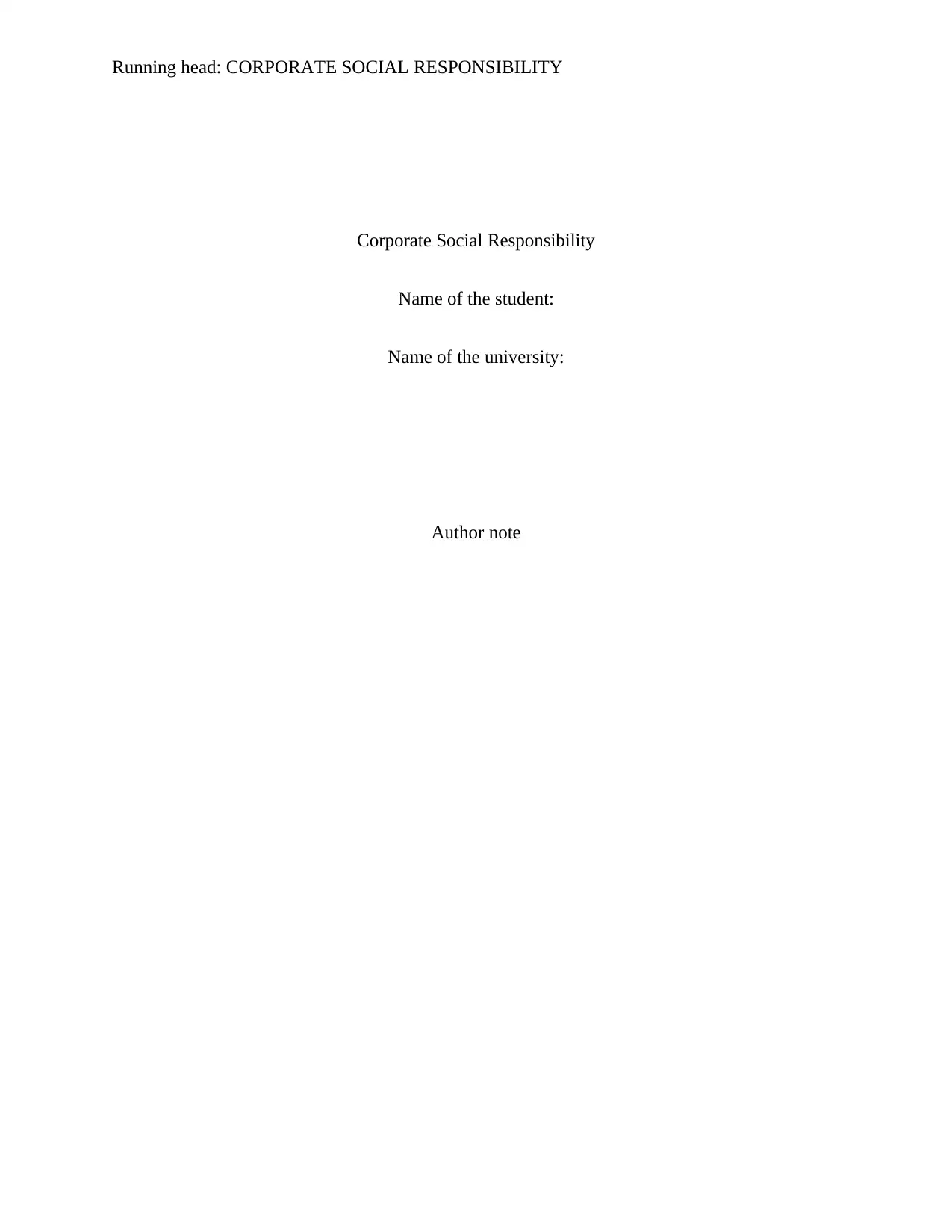
Running head: CORPORATE SOCIAL RESPONSIBILITY
Corporate Social Responsibility
Name of the student:
Name of the university:
Author note
Corporate Social Responsibility
Name of the student:
Name of the university:
Author note
Paraphrase This Document
Need a fresh take? Get an instant paraphrase of this document with our AI Paraphraser
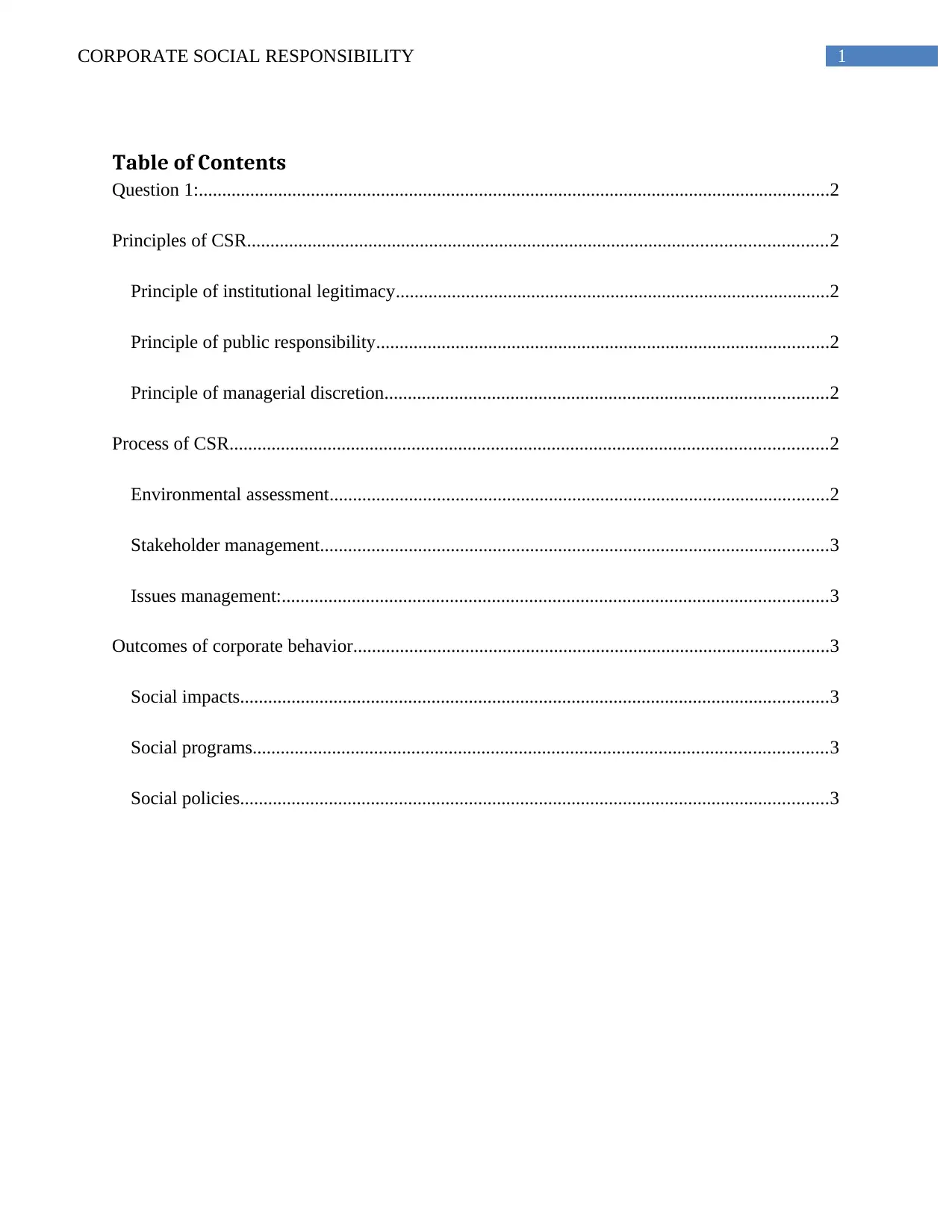
1CORPORATE SOCIAL RESPONSIBILITY
Table of Contents
Question 1:.......................................................................................................................................2
Principles of CSR............................................................................................................................2
Principle of institutional legitimacy.............................................................................................2
Principle of public responsibility.................................................................................................2
Principle of managerial discretion...............................................................................................2
Process of CSR................................................................................................................................2
Environmental assessment...........................................................................................................2
Stakeholder management.............................................................................................................3
Issues management:.....................................................................................................................3
Outcomes of corporate behavior......................................................................................................3
Social impacts..............................................................................................................................3
Social programs...........................................................................................................................3
Social policies..............................................................................................................................3
Table of Contents
Question 1:.......................................................................................................................................2
Principles of CSR............................................................................................................................2
Principle of institutional legitimacy.............................................................................................2
Principle of public responsibility.................................................................................................2
Principle of managerial discretion...............................................................................................2
Process of CSR................................................................................................................................2
Environmental assessment...........................................................................................................2
Stakeholder management.............................................................................................................3
Issues management:.....................................................................................................................3
Outcomes of corporate behavior......................................................................................................3
Social impacts..............................................................................................................................3
Social programs...........................................................................................................................3
Social policies..............................................................................................................................3
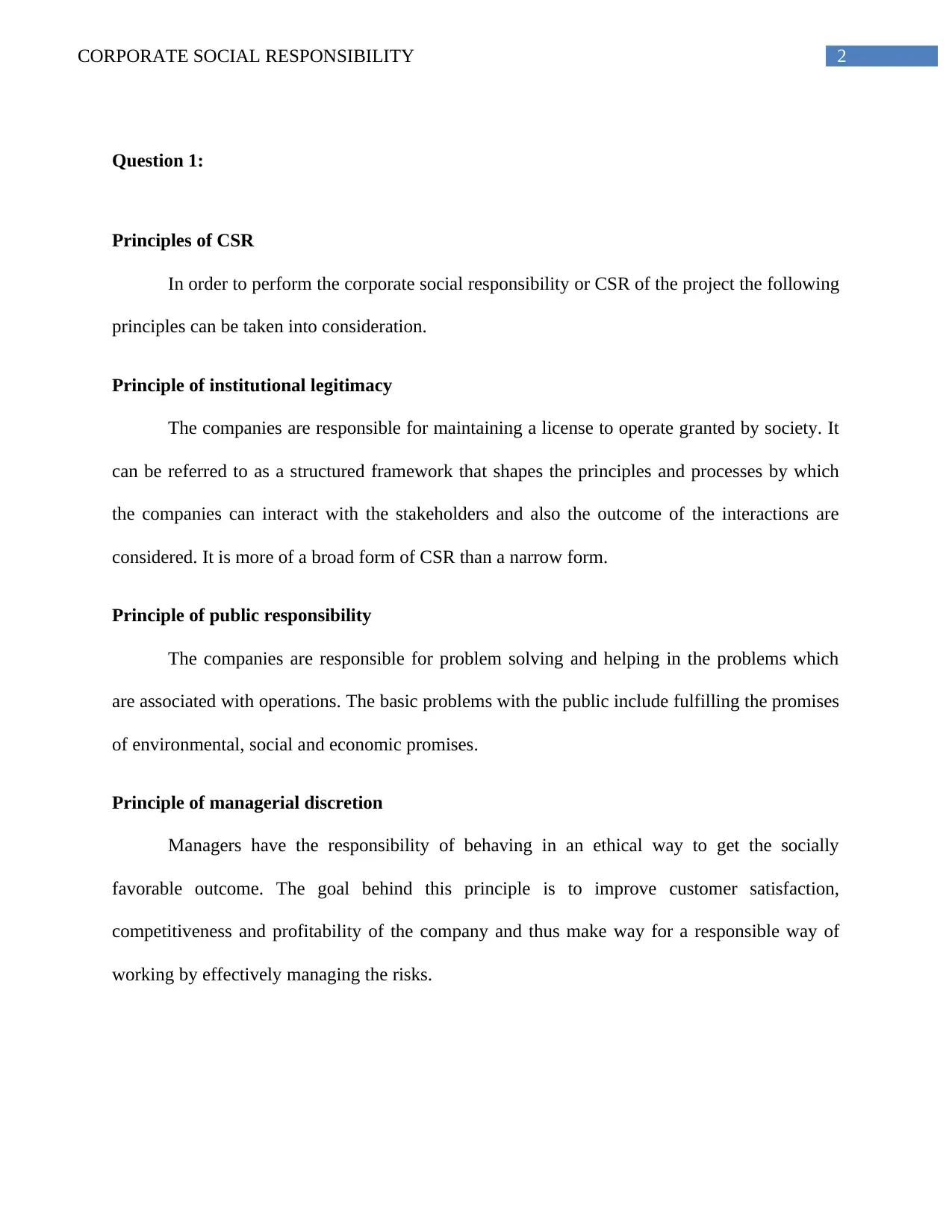
2CORPORATE SOCIAL RESPONSIBILITY
Question 1:
Principles of CSR
In order to perform the corporate social responsibility or CSR of the project the following
principles can be taken into consideration.
Principle of institutional legitimacy
The companies are responsible for maintaining a license to operate granted by society. It
can be referred to as a structured framework that shapes the principles and processes by which
the companies can interact with the stakeholders and also the outcome of the interactions are
considered. It is more of a broad form of CSR than a narrow form.
Principle of public responsibility
The companies are responsible for problem solving and helping in the problems which
are associated with operations. The basic problems with the public include fulfilling the promises
of environmental, social and economic promises.
Principle of managerial discretion
Managers have the responsibility of behaving in an ethical way to get the socially
favorable outcome. The goal behind this principle is to improve customer satisfaction,
competitiveness and profitability of the company and thus make way for a responsible way of
working by effectively managing the risks.
Question 1:
Principles of CSR
In order to perform the corporate social responsibility or CSR of the project the following
principles can be taken into consideration.
Principle of institutional legitimacy
The companies are responsible for maintaining a license to operate granted by society. It
can be referred to as a structured framework that shapes the principles and processes by which
the companies can interact with the stakeholders and also the outcome of the interactions are
considered. It is more of a broad form of CSR than a narrow form.
Principle of public responsibility
The companies are responsible for problem solving and helping in the problems which
are associated with operations. The basic problems with the public include fulfilling the promises
of environmental, social and economic promises.
Principle of managerial discretion
Managers have the responsibility of behaving in an ethical way to get the socially
favorable outcome. The goal behind this principle is to improve customer satisfaction,
competitiveness and profitability of the company and thus make way for a responsible way of
working by effectively managing the risks.
⊘ This is a preview!⊘
Do you want full access?
Subscribe today to unlock all pages.

Trusted by 1+ million students worldwide
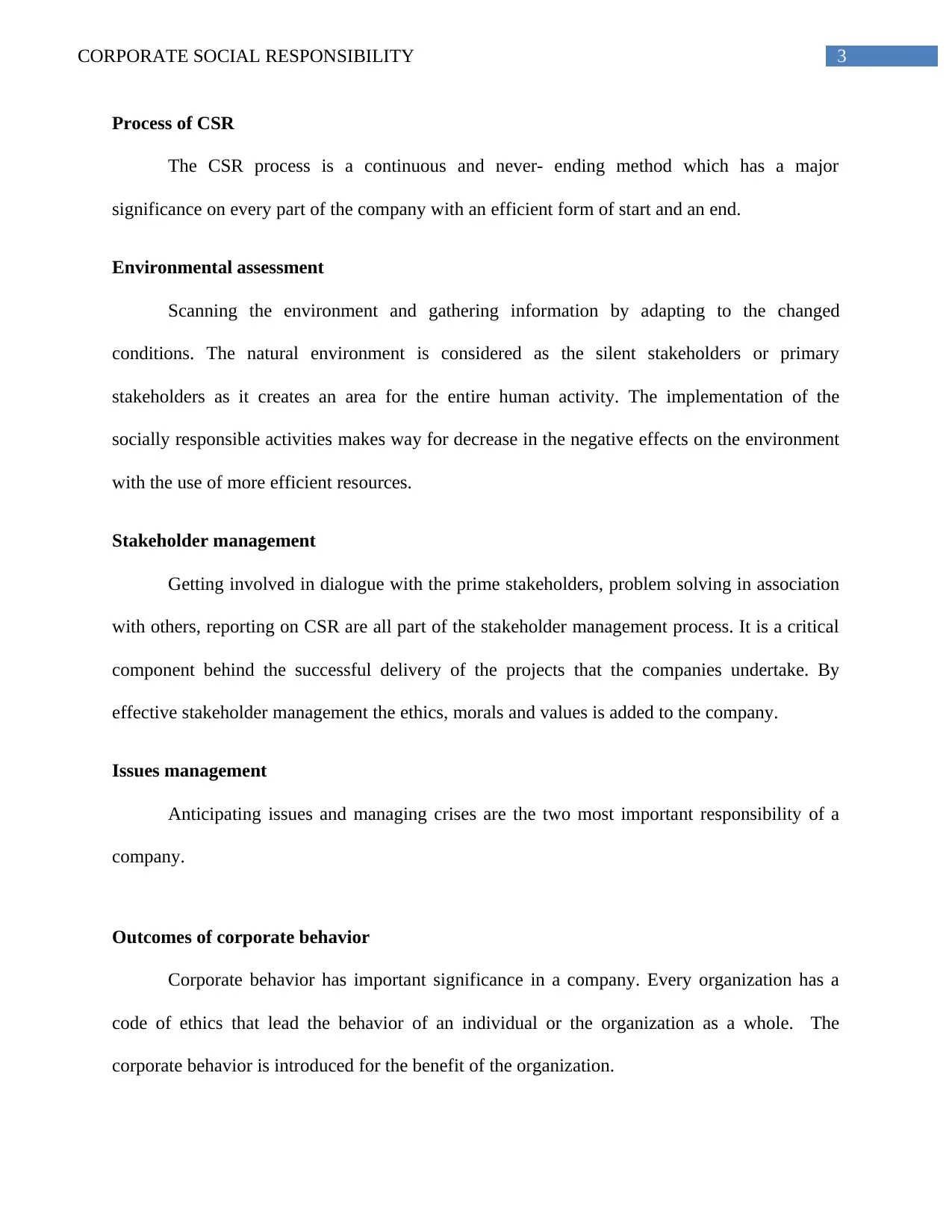
3CORPORATE SOCIAL RESPONSIBILITY
Process of CSR
The CSR process is a continuous and never- ending method which has a major
significance on every part of the company with an efficient form of start and an end.
Environmental assessment
Scanning the environment and gathering information by adapting to the changed
conditions. The natural environment is considered as the silent stakeholders or primary
stakeholders as it creates an area for the entire human activity. The implementation of the
socially responsible activities makes way for decrease in the negative effects on the environment
with the use of more efficient resources.
Stakeholder management
Getting involved in dialogue with the prime stakeholders, problem solving in association
with others, reporting on CSR are all part of the stakeholder management process. It is a critical
component behind the successful delivery of the projects that the companies undertake. By
effective stakeholder management the ethics, morals and values is added to the company.
Issues management
Anticipating issues and managing crises are the two most important responsibility of a
company.
Outcomes of corporate behavior
Corporate behavior has important significance in a company. Every organization has a
code of ethics that lead the behavior of an individual or the organization as a whole. The
corporate behavior is introduced for the benefit of the organization.
Process of CSR
The CSR process is a continuous and never- ending method which has a major
significance on every part of the company with an efficient form of start and an end.
Environmental assessment
Scanning the environment and gathering information by adapting to the changed
conditions. The natural environment is considered as the silent stakeholders or primary
stakeholders as it creates an area for the entire human activity. The implementation of the
socially responsible activities makes way for decrease in the negative effects on the environment
with the use of more efficient resources.
Stakeholder management
Getting involved in dialogue with the prime stakeholders, problem solving in association
with others, reporting on CSR are all part of the stakeholder management process. It is a critical
component behind the successful delivery of the projects that the companies undertake. By
effective stakeholder management the ethics, morals and values is added to the company.
Issues management
Anticipating issues and managing crises are the two most important responsibility of a
company.
Outcomes of corporate behavior
Corporate behavior has important significance in a company. Every organization has a
code of ethics that lead the behavior of an individual or the organization as a whole. The
corporate behavior is introduced for the benefit of the organization.
Paraphrase This Document
Need a fresh take? Get an instant paraphrase of this document with our AI Paraphraser
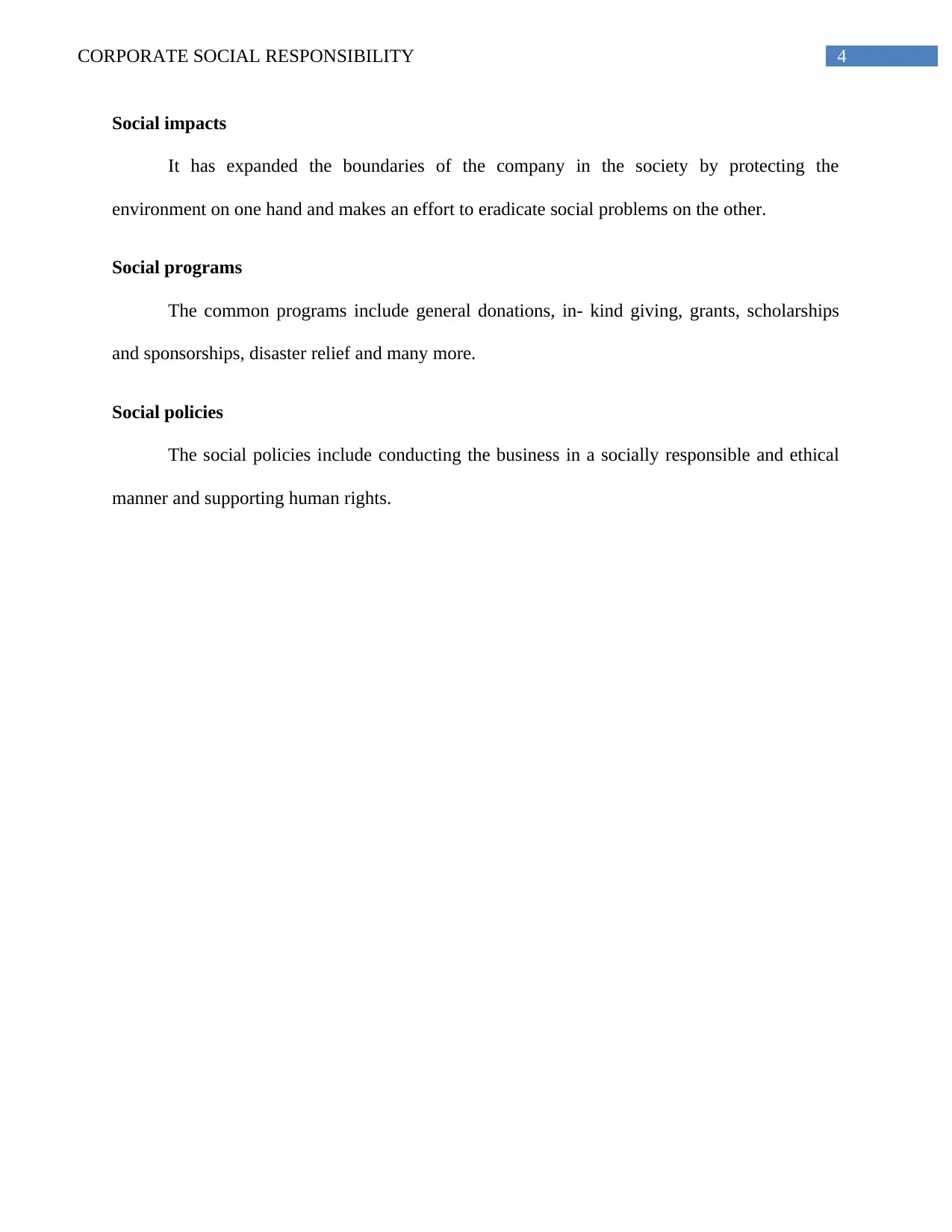
4CORPORATE SOCIAL RESPONSIBILITY
Social impacts
It has expanded the boundaries of the company in the society by protecting the
environment on one hand and makes an effort to eradicate social problems on the other.
Social programs
The common programs include general donations, in- kind giving, grants, scholarships
and sponsorships, disaster relief and many more.
Social policies
The social policies include conducting the business in a socially responsible and ethical
manner and supporting human rights.
Social impacts
It has expanded the boundaries of the company in the society by protecting the
environment on one hand and makes an effort to eradicate social problems on the other.
Social programs
The common programs include general donations, in- kind giving, grants, scholarships
and sponsorships, disaster relief and many more.
Social policies
The social policies include conducting the business in a socially responsible and ethical
manner and supporting human rights.
1 out of 5
Related Documents
Your All-in-One AI-Powered Toolkit for Academic Success.
+13062052269
info@desklib.com
Available 24*7 on WhatsApp / Email
![[object Object]](/_next/static/media/star-bottom.7253800d.svg)
Unlock your academic potential
Copyright © 2020–2026 A2Z Services. All Rights Reserved. Developed and managed by ZUCOL.




